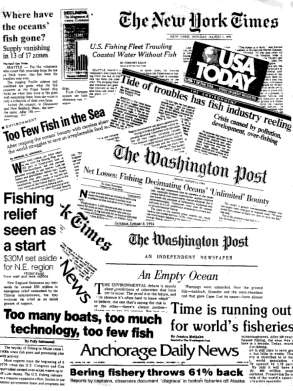SATURATING MEDIA CAMPAIGN SET THE STAGE FOR 1990s GULF WARS

The power of the individual foundation giant is enormous. When there is likemindedness among a group of these giants…the power is magnified hugely. When such foundations do good, they justify the tax-exempt status which the people grant them. When they do harm, it can be immense harm—there is virtually no counterforce to oppose them.
—Rene A Wormser,
“Foundations: Their Power and Influence,”
1958
Let us recall that a pattern has emerged revealing the strategy of environmental leaders, from a growing number of national environmental organizations and from federal regulating agencies themselves. First these leaders create the perception of an environmental holocaust by manufacturing plausible horror scenarios based to a small degree in truth. Once the “catastrophe” is raised to the level of hysteria, environmental leaders use the sense of urgency to demand that legislation be passed now, before it is too late.
—Michael S. Coffman,
“Saviors of the Earth?” 1994
The shift in terminology from such words as fishing, farming, and logging to “extractive industries” carries a negative moral weight, which in turn justifies the turning over of resources to the morally superior non-extractive users. The latent function of such thinking, however, is colonialist in nature. It is a classic case of urban exploitation of the rural hinterland. In this case, the hinterland is no longer permitted to export its raw materials, its wealth, to urban areas for processing as it could in previous eras. Rather, rural sources of income in the form of trees, fish, and land are transformed into a means of recreation for tourists.
—Irene Martin,
“Legacy and Testament: The Story of
Columbia River Gillnetters,” 1994
Ever since we first arrived on the continent, Americans have enjoyed the cornucopia of fish, shellfish and other seafood pulled from our rivers, lakes, bays, and oceans. That is, until the 1990s when, after 10,000 years of harvesting, every fish everywhere was suddenly overfished, endangered, on the brink of extinction!
What happened?
The Environmentalists found fishing.
NETS
Nets are the ancient but effective tools that enable commercial fishermen to earn their livelihoods and sustain the marketing infrastructure that moves wild fish from the dock to the consumer’s plate. By catching fish and exporting them from their coastal communities, productive fishermen had long ago built economies and cultures that were models of sustainability.
By the 1990s, however, production in the U.S. was discouraged, consumption drove the nation’s economy, and commercial fishermen were under attack from both the left and the right.
The books in New Moon’s Gulf Wars Series chronicle the battles over commercial fishing nets that erupted in four of the five Gulf of Mexico states during the mid-1990s.
But these were by no means the only states that saw action at that time—this was a national movement and sport-fishing interests went on the attack in at least seven other coastal states including California, Oregon, Washington, Alaska, New Jersey, Maryland, and North Carolina—plus inland Pennsylvania—in the early to mid-1990s.
Why then?
When urban environmentalists came into fishing in the 1990s, they set out to educate us about our renewable marine resources: Their spare-no-expense media campaign relentlessly disparaged commercial fishing, gave recreational fishing a pass, and reached every citizen not marooned on a deserted island.
Bingo.
What follows is an outline of the events that—intentionally or not—paved the way for the recreational fishing industry’s coordinated assault on our artisanal fishermen in the Gulf of Mexico and around the country in the 1990s. Highlights since that time suggest that further attacks on our domestic seafood supply are forthcoming.
